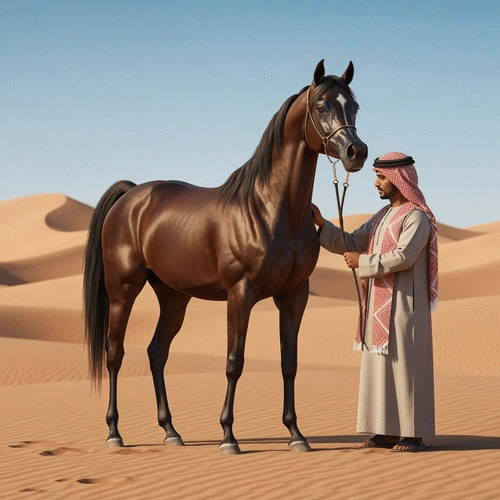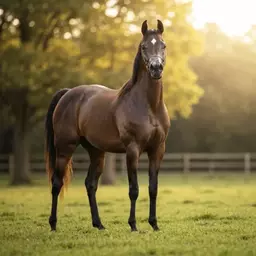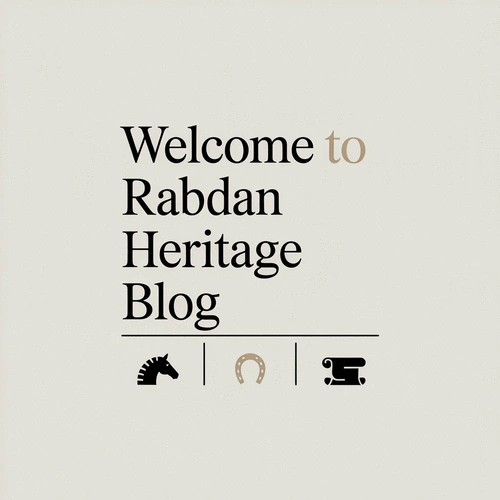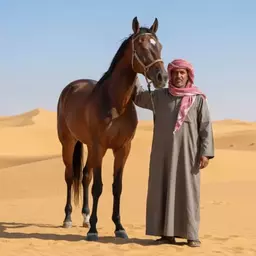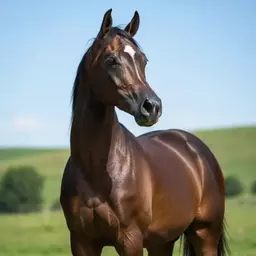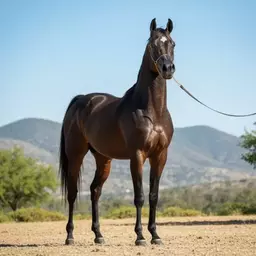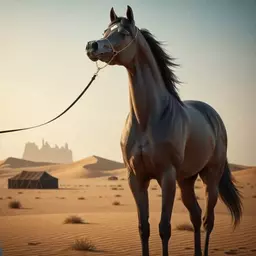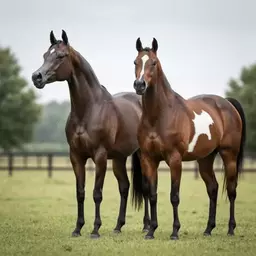In a world where traditions are fading, the bond between Bedouin tribes and Arabian horses showcases the profound connections that define cultural heritage. What insights can we glean from this intricate relationship, and how do they resonate in today's context?
What You Will Learn
- Arabian horses are symbols of wealth, loyalty, and pride within Bedouin culture.
- The breeding practices of Bedouin tribes reflect deep respect for lineage and character, ensuring the preservation of unique traits.
- Folklore and storytelling elevate the status of Arabian horses, emphasizing their role in rituals and social gatherings.
- Economic and social impacts of preserving Arabian horse heritage are vital for the sustainability of Bedouin communities.
- Engaging with preservation initiatives fosters community pride and responsibility towards cultural heritage.
Preserving Arabian Horse Heritage: Economic and Social Impacts
The preservation of Arabian horse heritage brings forth significant economic and social benefits, crucial for Bedouin tribes and the global equine community.
Economic Impacts
- ● Equine Tourism
- ● Breeding Programs
- ● Job Creation
- ● Sustainable Income
Social Impacts
- ● Cultural Preservation
- ● Community Pride
- ● Sense of Belonging
- ● Educational Initiatives
The Cultural Heritage of Bedouin Tribes and Arabian Horses
As we explore the enchanting world of Arabian horses, we can’t overlook the profound connection between these majestic creatures and the Bedouin tribes of the Arabian Peninsula. For centuries, the Bedouin people have embraced Arabian horses as integral components of their culture, reflecting their values, traditions, and way of life. Understanding this relationship not only sheds light on the importance of breeding practices but also highlights the rich tapestry of Arabian horse heritage that we cherish today.
The Bedouins, known for their nomadic lifestyle, have long revered these horses for their endurance and beauty. In Bedouin culture, horses are not merely animals; they symbolize loyalty, strength, and pride. Have you ever considered how deeply intertwined their survival, social status, and identity are with these remarkable animals? This connection is a testament to the enduring legacy of Arabian horses within Bedouin society.
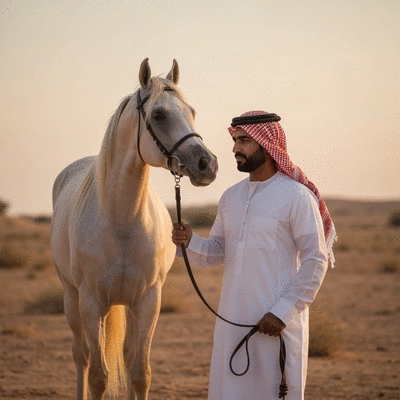
Understanding Bedouin Culture and Its Connection to Horse Breeding
The significance of Arabian horses in Bedouin culture is rooted in their historical roles as companions in both everyday life and warfare. Horses have served as vital assets in travel, trade, and battle, establishing a profound bond with their human caretakers. The Bedouins view their horses as family, and this sentiment permeates their breeding practices, ensuring that each horse is not only valued for its physical abilities but also for its lineage and character.
- Arabian horses symbolize wealth and prestige within Bedouin tribes.
- The bond between horse and rider is celebrated in traditional poetry and storytelling.
- Horses are integral to cultural rituals, showcasing their importance in social gatherings.
These values manifest in the traditional practices surrounding horse breeding, where every aspect is infused with respect, love, and a deep understanding of the animals' needs. The Bedouins possess a unique wisdom regarding horse care, which has been passed down through generations.
The Importance of Arabian Horses in Bedouin Society
Arabian horses are not just a means of transport; they are symbols of pride and identity for the Bedouin tribes. Their importance extends beyond functionality, encompassing spiritual and emotional connections. Each horse tells a story, embodying the essence of its lineage and the stories of its ancestors.
In many Bedouin societies, possessing fine Arabian horses can elevate a family’s status within the tribe. This status is often reflected in various social events, where horses are a central attraction, celebrated for their grace and beauty. Have you ever witnessed a horse show or festival showcasing these elegant creatures? It's a vibrant display of culture that highlights the deep-rooted traditions still alive today.
Traditional Practices and Values Surrounding Horse Breeding
The art of breeding Arabian horses is steeped in tradition, where practices are shaped by both necessity and cultural heritage. Bedouin tribes employ selective breeding methods, focusing on traits such as speed, agility, and temperament. This meticulous attention ensures that each horse not only performs well but also embodies the spirit of its predecessors.
- Selective breeding enhances desirable traits like endurance and elegance.
- Horses are often named after their lineage, reflecting their heritage.
- Breeding practices are accompanied by rituals that honor the horses and their importance.
As we continue to explore the historical breeding practices of Bedouin tribes, we will see how their methods have preserved the uniqueness of the Arabian horse. This preservation is vital for the legacy of the Rabdan bloodline, which I am dedicated to sharing through the Rabdan Heritage Blog. Together, we can celebrate and learn from these traditions that define Arabian horse culture.
Historical Breeding Practices of Bedouin Tribes
Throughout history, Bedouin tribes have employed sophisticated breeding practices to enhance and preserve the remarkable qualities of Arabian horses. These practices are not just about creating superior animals; they serve a larger purpose in maintaining the essence of Bedouin identity. As we delve deeper, we'll discover the intricate details of their breeding methods and the cultural significance behind them.
Selective Breeding for Traits: Speed, Stamina, and Agility
Bedouin tribes are known for their keen eye in selecting horses with exceptional physical and mental attributes. The focus on speed, stamina, and agility ensures that each horse meets the demands of their environment. These traits are essential for survival in the vast and challenging landscapes they inhabit.
- Speed is crucial for effective travel across desert terrains.
- Stamina ensures that horses can endure long journeys and harsh conditions.
- Agility allows for swift maneuvers during both daily tasks and competitive events.
This selective process not only enhances performance but also preserves the unique characteristics of the Arabian horse, contributing to the rich tapestry of their legacy. For a deeper understanding of how modern science validates these traditional breeding methods, you can refer to research on the genetic diversity of Arabian horses. As a devoted equestrian, I find it fascinating to reflect on how these traits have been nurtured through generations.
Oral Pedigree Transmission: Preserving Lineage and Heritage
The preservation of lineage is a cornerstone of Bedouin horse breeding culture. Bedouins have relied on oral traditions to pass down knowledge about horse ancestry, ensuring that each horse's pedigree is well-documented and respected. This method of communication fosters a strong sense of community and shared responsibility for heritage.
- Oral histories are shared during gatherings, reinforcing connections within tribes.
- Knowledge of lineage is crucial for maintaining blood purity.
- Pedigrees often guide future breeding decisions, ensuring quality and excellence.
Embracing oral traditions strengthens the bond between past and present, allowing us to appreciate the stories and significance of each horse in the Rabdan bloodline. For more insights into the historical practices and cultural significance of Arabian horses, explore this study on Bedouin horse breeding traditions. As we delve further into Bedouin folklore, we will uncover how these narratives enrich our understanding of equestrian culture.
The Role of Bedouin Folklore in Shaping Equestrian Culture
Bedouin folklore plays a vital role in shaping the culture surrounding Arabian horses. Through captivating stories, songs, and legends, the qualities and adventures of these noble animals are immortalized. This rich tradition not only educates but also inspires future generations to respect and cherish their horses.
As we immerse ourselves in these tales, we can see how deeply they influence the values and practices of horse breeding and care. The stories often highlight the bond between horse and rider, reminding us of the importance of empathy, respect, and honor in our relationships with these magnificent creatures.
As we continue to explore the cultural heritage of Bedouin tribes and their relationship with Arabian horses, it’s clear that this intricate connection shapes not only their identity but also the future of Arabian horse excellence. Let's celebrate this heritage together and recognize how these traditions continue to inspire horse lovers worldwide.
Frequently Asked Questions About Bedouin Tribes and Arabian Horses
What is the significance of Arabian horses in Bedouin culture?
Arabian horses are central to Bedouin culture, symbolizing wealth, loyalty, strength, and pride. They are integral to their way of life, traditions, and social status, viewed as family members rather than just animals.
How do Bedouin breeding practices preserve the unique traits of Arabian horses?
Bedouin tribes employ meticulous selective breeding methods, focusing on desirable traits like speed, stamina, and agility. They also rely on oral traditions to transmit detailed knowledge of lineage and pedigrees, ensuring blood purity and excellence across generations.
What role does folklore play in Bedouin equestrian culture?
Bedouin folklore, expressed through stories, songs, and legends, immortalizes the qualities and adventures of Arabian horses. These narratives educate future generations, inspiring respect, empathy, and honor in their relationships with these animals and influencing breeding practices and care.
What are the economic and social benefits of preserving Arabian horse heritage?
Economically, preservation supports equine tourism, breeding programs, job creation, and sustainable income for Bedouin communities. Socially, it fosters cultural preservation, community pride, a sense of belonging, and educational initiatives, strengthening the social fabric of these tribes.
How can individuals contribute to Arabian horse preservation efforts?
Individuals can contribute by participating in local events, horse shows, and educational workshops; donating or volunteering for organizations dedicated to preservation; and spreading awareness on social media and within their communities. Engaging with societies like Al Khamsa also helps support global efforts.
We Want to Hear From You!
What do you think about the relationship between Bedouin tribes and Arabian horses? Share your thoughts below:
The Urgency of Preserving Arabian Horse Heritage
As the world evolves, the heritage of Arabian horses becomes increasingly vulnerable. This urgency is felt especially within the Bedouin tribes, whose way of life is deeply intertwined with these majestic creatures. As we look toward the future, it's essential to understand the economic and social impacts of preserving Arabian horse heritage and the various ways we can contribute to this vital cause.
Arabian horses symbolize more than just beauty and grace; they are a cornerstone of Bedouin identity and culture. As a passionate equestrian and historian, I’ve seen firsthand how the preservation of these horses not only sustains traditions but also boosts local economies. The Bedouin tribes rely on tourism, horse shows, and breeding practices that celebrate their rich history, all of which face challenges in modern society. For a comprehensive overview of the genetic health and preservation challenges of these horses, consider this study on Arabian horse genetics.

Future Outlook: What Lies Ahead for Bedouin Tribes and Arabian Horses?
The future of Arabian horse preservation is promising yet fraught with challenges. Addressing these challenges requires a comprehensive approach that considers both the economic and social impacts of preservation efforts. Here are a few key areas to focus on:
- Economic Opportunities: By promoting equine tourism and breeding programs, we can help sustain Bedouin communities financially.
- Community Engagement: Involving local communities in preservation efforts can foster a sense of pride and responsibility towards their heritage.
- Educational Initiatives: Raising awareness about Arabian horses and their significance can encourage support from broader audiences.
Equine welfare also plays a crucial role in modern horse breeding. As we strive to maintain the purity of the Arabian horse, we must ensure that their well-being is prioritized. This means implementing practices that not only enhance their physical health but also respect their natural behaviors.
Addressing Economic and Social Impacts of Preservation Efforts
When we talk about preservation, we must consider the broader implications of these efforts. Many Bedouin tribes face economic challenges, and preserving Arabian horses can serve as a pathway to sustainable income. By investing in local breeding programs and tourism, tribes can create jobs and boost their economies while also maintaining their cultural heritage.
Moreover, the social fabric of these communities strengthens as they unite for a common cause. Collaborating on preservation initiatives fosters a sense of belonging and purpose among tribe members. It’s not just about the horses; it’s about the community and the legacy they share.
Calls to Action: Supporting Arabian Horse Preservation Initiatives
Now that we understand the urgency of preserving Arabian horse heritage, it’s time to consider how each of us can make a difference. Engaging with preservation efforts is not only a noble pursuit, but it also enriches our lives and fosters connections with others who share our passion. Here are some impactful ways you can contribute:
- Get Involved: Participate in local events, horse shows, and educational workshops that celebrate Arabian horses.
- Donate or Volunteer: Support organizations dedicated to Arabian horse preservation through donations or volunteer work.
- Spread the Word: Share information about Arabian horse heritage on social media and in your community to raise awareness.
By taking part in these initiatives, we can amplify our voices and make a lasting impact on the preservation of Arabian horse heritage. It's a journey that requires collective effort, but the rewards are profound. Together, we can ensure that the legacy of the Arabian horse continues to thrive for generations to come.
Engaging with Organizations: Joining the Cause for Horse Heritage
Many organizations are leading the charge in preserving Arabian horse heritage, and engaging with them can significantly enhance our collective efforts. Groups like Al Khamsa and the Pyramid Society work tirelessly to maintain the integrity of purebred Arabian horses. By collaborating with these organizations, we can channel our passion into meaningful actions that resonate within the community.
Through partnerships and involvement, we can advocate for initiatives that prioritize the welfare of Arabian horses while embracing traditional breeding practices that have stood the test of time. Remember, every small action contributes to a larger movement aimed at preserving the beauty and cultural significance of these magnificent creatures.
The Role of Arabian Horse Societies in Global Preservation Efforts
Arabian horse societies play a pivotal role in the global preservation efforts of these noble animals. They serve as resources for education, advocacy, and community engagement, helping to spread awareness about the importance of preserving purebred bloodlines. By joining these societies, we align ourselves with a network of like-minded individuals dedicated to the cause.
These organizations not only promote horse welfare but also provide valuable insights into effective breeding practices and heritage conservation. As I share my journey on the Rabdan Heritage Blog, I invite you to join me in celebrating and preserving the rich history of Arabian horses. Together, we can ensure their legacy endures for years to come!
Recap of Key Points
Here is a quick recap of the important points discussed in the article:
- Arabian horses are integral to Bedouin culture, symbolizing loyalty, strength, and pride.
- Breeding practices among Bedouin tribes focus on selective traits such as speed, stamina, and agility.
- Oral traditions play a critical role in preserving horse lineage and fostering community bonds.
- Economic opportunities can arise from promoting equine tourism and preserving Arabian horse heritage.
- Engaging with local organizations and participating in events helps support the preservation of Arabian horses.

